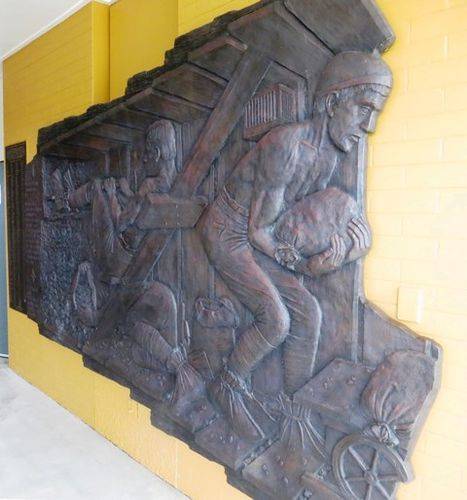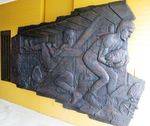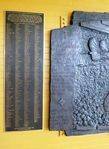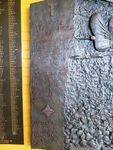
Home » Themes » Conflict » World War One
Tunnellers MemorialPrint Page 
The wall mounted sculpture commemorates the 4500 tunnellers who served in World War One, many of whom were miners from North Queensland.
The Battle of Messines took place on the Western front of the First World War. It began on 7 June 1917 when the British Second Army under the command of General Herbert Plumer launched an offensive near the village of Mesen (Messines) in West Flanders, Belgium. The battle began with the detonation of 19 mines just before the infantry assault, a tactic which disrupted German defences and with a huge artillery bombardment allowed the advancing troops to secure their objectives in rapid fashion.
Co-ordinated by the tunnelling companies of the Royal Engineers over a period of more than a year, Canadian, Australian, New Zealand and British engineers tunnelled under the German trenches and laid 22 mines with 455 tonnes of ammonal explosive. The galleries dug in order to lay these mines were over 8,000 metres long and had been constructed in the face of tenacious German counter-mining efforts. On several occasions, German tunnellers came within metres of large British mine "chambers".
Location
| Address: | Mitchell & Isley Streets, Army Museum, Jezzine Barracks, Kissing Point, North Ward, 4810 |
|---|---|
| State: | QLD |
| Area: | AUS |
| GPS Coordinates: | Lat: -19.240335 Long: 146.802617 Note: GPS Coordinates are approximate. |
Details
| Monument Type: | Sculpture |
|---|---|
| Monument Theme: | Conflict |
| Sub-Theme: | WW1 |
| Actual Event Start Date: | 04-August-1914 |
| Actual Event End Date: | 28-June-1919 |
| Artist: | Michael Meszaros |
Dedication
| Actual Monument Dedication Date: | Friday 8th June, 2012 |
|---|
Australian Tunnelling Coys
1918 - 1919
In memory of the Australian Tunnellers who fought a silent and claustrophobic war below the trenches on the Western Front during the Great War
1914 - 1919.
Electrical and Mechanical Mining and Boring Coy
1916 - 1919.
In honour of the service and sacrifice of Australian Tunnellers who served in the First World War.
Over 4,500 men, from 6 nominal tunnelling companies and the early Australian Mining Corps reorganised on the Western Front as the Australian Tunnelling Companies with their support unit, the Australian Electrical and Mechanical Mining and Boring Coy ( the Alphabetical Company).
These soldiers worked to destroy the German front lines by detonating mines under No Man`s land whilst defending their own front lines from similar attacks. Australian Tunnellers took part in some of the most famous battles of the war including Fromelles, Arras, Messines, Passchendaele (Third Ypres), Cambrai, the defence of Amiens, Lys , and the famous last `Hundred Days` from 8 August 1918.
Those men who died in service to their country are listed below.
[ Names ]









